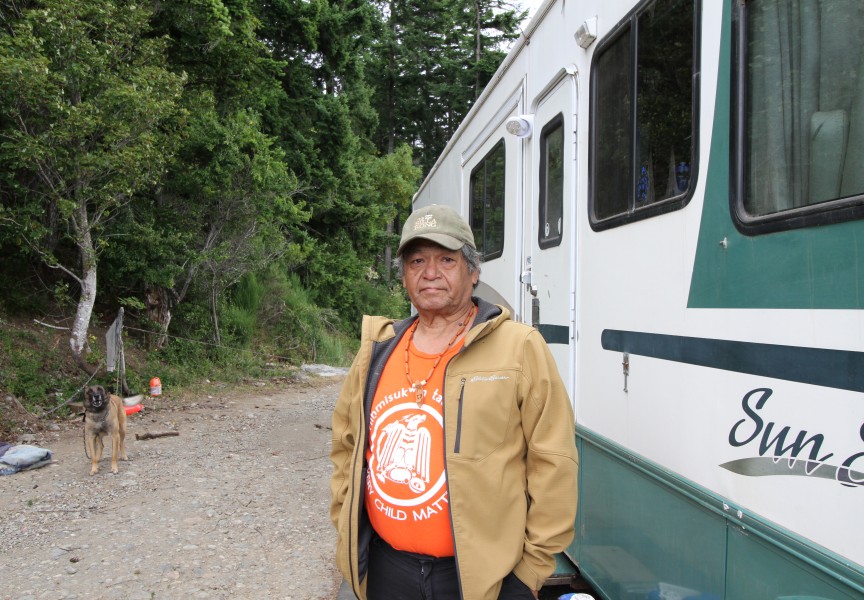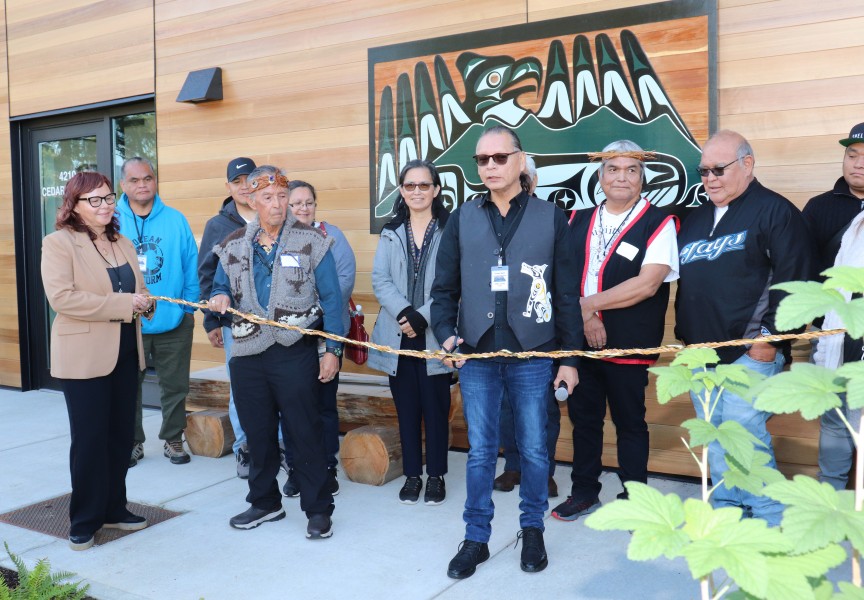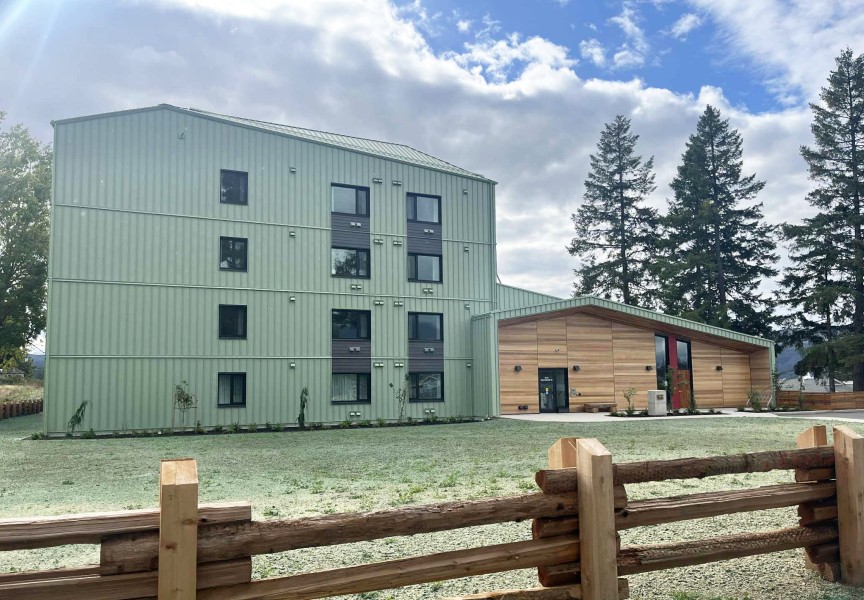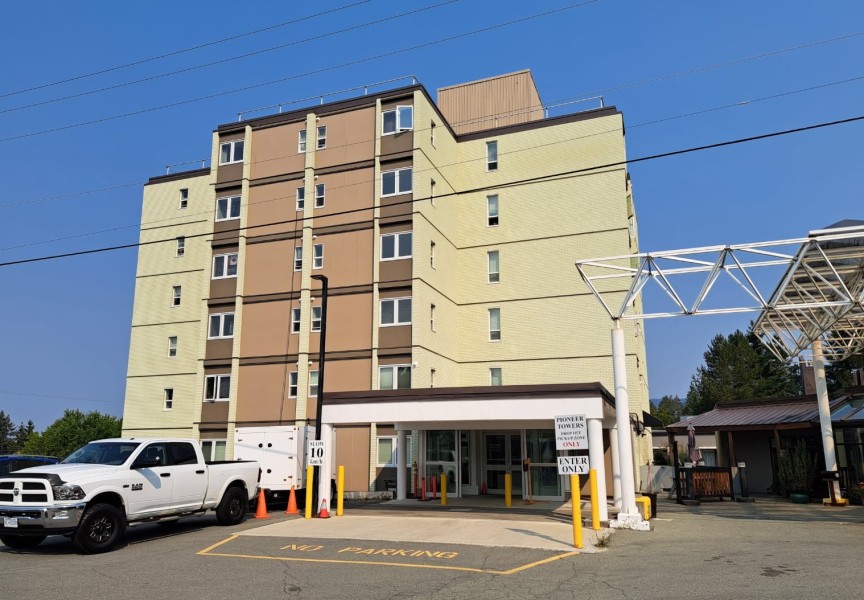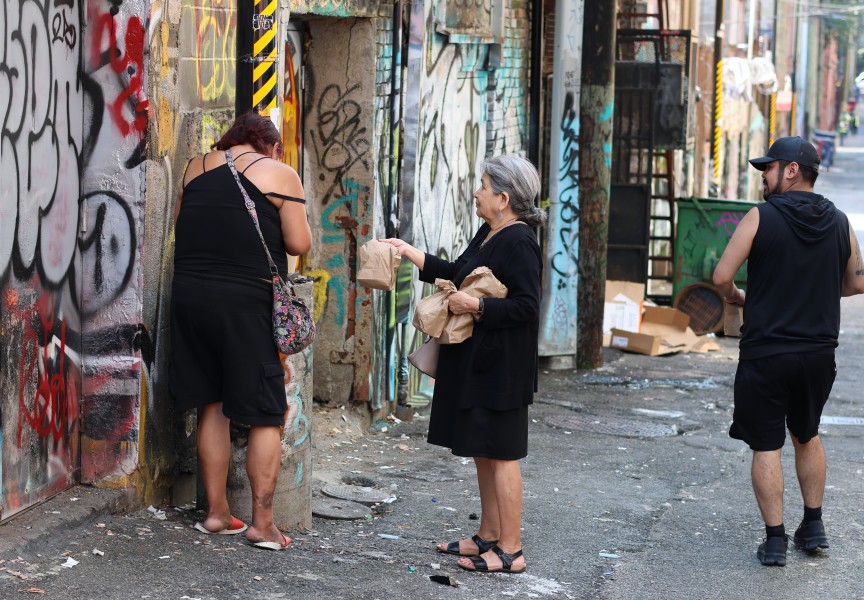Cradled in Yuułuʔiłʔatḥ - Ucluelet First Nation (UFN) traditional territory on Vancouver Island, Olsen Bay, or C’iiłukᵂis meaning “soft beach”, is the site of a 24.8-acre high-density residential development proposed by Australian businessman Josh Hunt, CEO of ERIF Sustainable Solutions.
Traditionally described as the “shallow soft bottomed bay reaching close to the road”, the site at 221 Minato Road in Ucluelet was partially cleared about five years ago by its former owners for a seasonal RV and campground.
At full buildout, ERIF’s housing proposal labelled ‘Serenity Landing’ would encompass one quarter of the small town’s current population of 2,066. To achieve this density, ERIF has asked permission to “clear most of the remaining trees on the site (excluding dedicated park areas) and remove the 30-metre treed buffer adjacent to Peninsula Road”.
ERIF first introduced their development plans to Ucluelet council on June 11, 2024. Their proposed building form of modular apartment condos uses “cutting-edge technology and sustainable practices” made by IGV-Nexus Housing Limited.
“This is a new technology that has a patent pending. This will be a first,” said Jodie Thompson, ERIF’s chief operating officer. She said this particular IGV-Nexus technology hasn’t been built anywhere in Canada or internationally.
While ERIF’s phased, mixed development of 240 market/attainable/tourist commercial apartments could potentially offer salvation to west coasters facing housing woes and staff shortages, some residents are expressing concerns about the scale of the proposal that sits on low-lying land next to a sensitive mudflat – and urged mayor and council to ensure legislation is in place in case the developer abandons site.
Over the past two decades, Ucluelet has dealt with a run of failed developments resulting in broken promises and abandoned eyesores to the community.
Most recently in 2022, Ucluelet council approved a mixed-use development at the corner of Rainforest Drive and Marine Drive, but the project has since stalled when the concrete test failed and is now tied up in insurance.
Wyndnsea, the notorious Jack Nicklaus 18-hole golf course resort and mixed-used development on the outskirts of Ucluelet, tanked in the wake of the global economic downturn of 2008 and eventually filed for bankruptcy in December 2014, leaving about 360-acres of partially developed land and a long line of creditors who are owed over $100 million.
Hunt, 53, is also the CEO of IGV-Nexus Housing Limited. He made Australian headlines in 2009 and 2010 when his luxury Hunt Resort in Queensland went into receivership. The Sunshine Coast Daily reported that “former restaurateur, resort owner and developer Josh Hunt owes $200,722,484 to 28 individuals and companies, several of them on the Sunshine Coast.”
“Just as we were finishing that project, the global financial crisis hit and the bank that we were financed with went under. That was a really weird experience. You don’t expect your bank to go under,” said Hunt during a Jan. 21, 2025 Ucluelet public hearing.
“They dragged down every developer in Queensland, Australia on the same day. They foreclosed on the entire book on the same day. It was a very, very difficult time of life for us because what it was, it basically threw our entire life into turmoil,” he continued.
Ucluelet Councillor Ian Kennington pointed out it’s “fairly common for developers to encounter financial troubles at least once and often multiple times.”
“It is a high-risk business to be in. It should not eliminate the opportunity to push forward and learn from past setbacks. In fact, one could go so far as to say lessons learned are what makes future successes possible. This in my mind is not a matter of concern,” said Kennington in a written statement to the Ha-shilth-sa.
Hunt says the ordeal motivated him to “build faster, build cheaper.” He moved his architect and builder to China and opened a modular manufacturing company.
“Within about 18 months we had a factory to the size that we could build a 100-room hotel in eight days,” Hunt said, adding that his construction experience also includes building low-cost housing in Peru with a German partner and setting up a second manufacturing facility in Kazakhstan.
ERIF’s proposal also includes 11 waterfront homes; Hunt plans to live in one with his family and has sold five to friends on the ERIF team to “bring down the cost of development”.
ERIF has established itself as a non-for-profit housing provider with a mission to make homeownership more attainable for Ucluelet locals. They say they have applied for government grants and that the process will be guided by a local housing committee to “ensure the program meets the need of the community”.
“We are not looking to make any money from this project whatsoever,” said Hunt at the public hearing.
“There is no developer profit margin in Lot 1 and 2,” Thompson re-iterated.
ERIF has a masterplan for 221 Minato Road that includes five lots they will roll out in phases. Phase One includes an attainable homeownership initiative of 29 apartments (2 one-bedroom units, 13 two-bedrooms units and 14 three-bed units).
In a draft agreement with the District of Ucluelet and ERIF, district staff used Census data to set the maximum sale price, excluding taxes, on the one- and two-bedroom ‘attainable homes’ at $567,000. For the three-bedroom dwelling, the maximum sale price was set at $865,000.
A Ucluelet housing needs report from 2021 shows that real estate sale prices in the area have grown rapidly over the last decade, with a notable rise over the course of 2020.
“A rough observation of 2015 indicates that about 18 per cent of households could afford the mortgage cost of the median home. By 2020, estimates suggest that this share decreased to about five per cent. In other words, 95 per cent of renter households could not reasonably afford half of the dwellings sold in the West Coast Region in 2020,” states the report.
Stage Two of ERIF’s masterplan involves the affordable housing units, but those units won’t come to fruition until “Stage One is completely sold out”, according to Hunt.
On Aug. 29, 2024, a UFN survey crew conducted a Preliminary Field Reconnaissance (PFR) of the land to identify and evaluate areas of archaeological and cultural significance.
UFN considers Olsen Bay to be of high archaeological importance and requested complete avoidance of one of the areas they identified as a traditional use site, which is located adjacent Peninsula Road within the forested area.
“Ucluelet First Nation considers these areas to have further archaeological potential for subsurface findings such as shell middens and/or lithic scatters,” reads the report compiled by Carey Cunneyworth, archeologist and UFN’s director of culture, language and heritage.
Mark Fortune, Ucluelet’s long-time deputy fire chief and a Minato Road resident, voiced concerns about several issues including the lack of a proper road design and the land being in a low-lying area. According to ERIF’s flood management plan, 76 per cent of the proposed development structures are located in a significant tsunami hazard zone.
“There is insufficient road development to evacuate this area in a timely manner with full buildout. I have had to evacuate our property numerous times in the past. I see this new development proposing a risk to my family’s safety and security without a proper road plan in place. How are we to access the safe zone in a traffic jam?” Fortune expressed in a written statement during the Jan. 21 Ucluelet public hearing.
Josh Jenkins, executive director of the Ucluelet Chamber of Commerce, expressed in the Jan. 21 public hearing that the lack of affordable housing has made it increasingly difficult to retain and attract the workforce Ucluelet so desperately needs.
“We want to emphasize that we do not advocate for unchecked development and growth,” Jenkins told mayor and council on behalf of the chamber.
“However, the pressing housing shortage must be addressed swiftly. With construction costs steadily increasing, the opportunity to provide genuinely affordable and attainable housing is rapidly diminishing. If action is not taken soon, we risk pricing out those who are in urgent need,” he said.
When ERIF first came to Canada, they started a relationship with Ka:'yu:'k't'h'/Che:k'tles7et'h' (Kyuquot Checleseht) First Nations and explored the possibility of a residential development in their territory.
“This has ceased to move forward due to severed ties with a private landowner in the area,” said Thompson. “Let’s just say his moral compass didn’t align with ours.”
At a Jan. 28, 2025 regular council meeting, Ucluelet mayor and council voted unanimously to move ERIF’s proposal along, but directed district staff to work with municipal solicitors to prepare a restrictive covenant on the property title “to ensure the development proceeds as proposed”.


